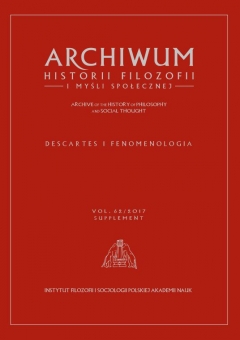Freedom, Equality, Truth. The Antinomies of Cartesianism in the Philosophy of Leszek Kołakowski
Freedom, Equality, Truth. The Antinomies of Cartesianism in the Philosophy of Leszek Kołakowski
Author(s): Andrzej GniazdowskiSubject(s): Epistemology, History of ideas, Contemporary Philosophy, Phenomenology
Published by: Instytut Filozofii i Socjologii Polskiej Akademii Nauk
Keywords: Phenomenology; Marxism; radicalism; truth; freedom; Kołakowski;
Summary/Abstract: The subject of this article are the Cartesian motifs in the thought of Leszek Kołakowski, one of the most important Polish philosophers of the 20th century. The author aims to show that the critical reflexion on the legitimacy and limits of the Cartesian search for knowledge based on the intuition of evidence and at the same time objectively true has organized not only philosophical, but also political thought of Kołakowski. He argues, that Leszek Kołakowski and the whole intellectual formation he belonged to, called the Warsaw School of the History of Ideas, interpreted Cartesianism as an attempt of establishing the integral, both philosophical and political, radicalism. The main thesis of this article is that Cartesianism was for Kołakowski and his colleagues, former Marxists, a radical philosophy not only of truth, but also of freedom. The question about the possibility of the unshakable, absolutely unquestionable foundations of knowledge, put by Kołakowski to Descartes and Husserl, is interpreted in the article as a part of his strategy of overcoming Marxism, understood as an ideology, that reduces human freedom to a mere epiphenomenon.
Journal: Archiwum Historii Filozofii i Myśli Społecznej
- Issue Year: 62/2017
- Issue No: 62supl.
- Page Range: 209-242
- Page Count: 34
- Language: Polish

